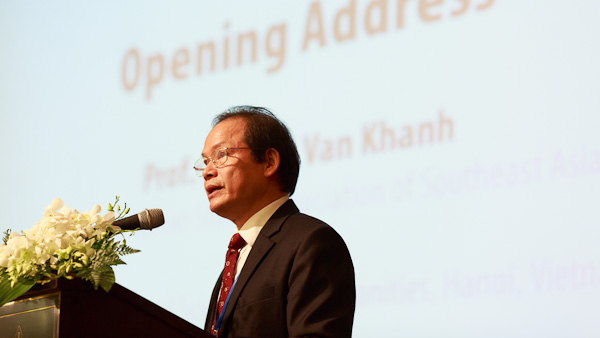On the sidelines of the 5th International Conference on Korean Studies, Professor Nguyen Van Khanh (Rector of the University of Social Sciences and Humanities, Vietnam National University, Hanoi) gave an interview to the press about the development of Korean studies in Vietnam and Southeast Asia.
Professor, could you please tell us a little about the Association for Korean Studies in Southeast Asia?The Association for Korean Studies in Southeast Asia, abbreviated as KoSASA, currently has 10 member universities in 7 Southeast Asian countries. The University of Social Sciences and Humanities - Vietnam National University, Hanoi, has been a key member for many years. According to the assignment, each university from a country serves as the president of the association for two years. This year, the University of Social Sciences and Humanities holds the chairmanship of KoSASA. This is a significant step forward, as leading universities in Southeast Asia are setting the direction for Korean studies in the region and promoting cooperation in research and education. The dedication and commitment of KoSASA's member organizations over the past eight years have fostered the flourishing development of Korean studies in Southeast Asia. Several important collaborative research projects have been successfully implemented by KoSASA's strategic partners in the fields of research, education, language, politics, economics, humanities, and business, revolving around the field of Korean Studies. KoSASA successfully organized four renowned conferences on Korean Studies in Southeast Asia in 2005, 2007, 2008, and 2011, respectively. This conference is the fifth KoSASA conference organized by the University of Social Sciences and Humanities, Hanoi.
Professor, how do you assess the influence of Korean culture on Vietnam?South Korea, once known as one of the world's poorest agricultural countries, has seriously implemented an economic development strategy since 1962. In less than four decades, the country has achieved economic successes recognized worldwide, known as the "Miracle on the Han River." Korean culture has also had a significant influence on countries in the region and around the world with the Hallyu wave. In the era of cultural integration, this trend continues to develop strongly. In Vietnam, many Korean cultural products such as films, music, books, and documents on Korean socio-economics have been imported since quite early on. This is a necessary need for development in the context of current globalization. This helps to enhance understanding of Korean culture among Vietnamese people, meeting the need for learning and sharing experiences between the people of the two countries. Over the past 20 years, cooperative relations between the two countries have also developed well, bringing benefits to both nations.
Professor, what difficulties have been encountered in establishing and developing the Korean Studies program at the Hanoi University of Social Sciences and Humanities, and what achievements have been made so far?The Faculty of Social Sciences and Humanities - Vietnam National University, Hanoi, is one of the earliest institutions in Vietnam to establish a Korean Studies program, dating back to 1993. Initially, the Department of Korean Studies faced numerous challenges regarding materials, curricula, and staff, particularly a lack of resources related to the economic, political, cultural, and social development of South Korea. However, after nearly 20 years of development, the Department now teaches over 40 full-time students annually. To date, more than 400 graduates have entered the program and are working in various government agencies as well as Korean-Vietnamese businesses. This is also a program with high entrance exam scores and attracts significant social interest. We are moving towards establishing Korean Studies as an independent program offering undergraduate and postgraduate degrees. Regarding staff, the Department of Korean Studies has 7 full-time lecturers, most of whom have received further training in South Korea. Furthermore, the Department invites many part-time lecturers from various universities and research institutes to teach. The KOICA Foundation annually sends Korean lecturers to teach at the University. The Korean Embassy in Vietnam and the Korea Foundation have helped the Department build a reading room with approximately 1000 Korean language books and numerous journals. Every year, many students at the University receive funding from Korean support foundations such as the KOICA Foundation, the Korea Foundation, and the Chung-Soo Foundation. Currently, the University has established a Korean Studies Center and provides Korean language training with international certification. This can be considered a significant step forward in the development of this field of study at the University of Social Sciences and Humanities in particular and Vietnam in general. To further develop this field of study, the University of Social Sciences and Humanities is committed to continuously expanding cooperation with KRI, UNSW, and other universities in Korea and other countries in the region in research and training on Korean studies.
 Professor, why is the theme of this conference on "New Aspects in Korean Studies Research Cooperation in Southeast Asia"?
Professor, why is the theme of this conference on "New Aspects in Korean Studies Research Cooperation in Southeast Asia"?The conference aims to emphasize the following issue: in the context of integration and globalization, the study of Korean Studies should not be confined to individual countries but should be expanded to include sharing experiences among Southeast Asian countries, especially through cooperation, support, and research sharing among Korean scientists and universities. In fact, over the years, KoSASA members have conducted several studies on new trends in research and training in Korean Studies across various academic fields. The 5th Conference will help strengthen and enrich these foundations to elevate Korean Studies to a new level. Starting with the 5th Conference, KoSASA will strive to become a research-oriented association, and its conferences will serve as a platform for publishing research results from collaborative projects; exchanging visions and future research programs among member universities and individual scholars in the region.
Thank you, Professor!

